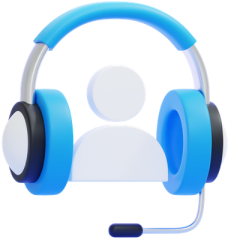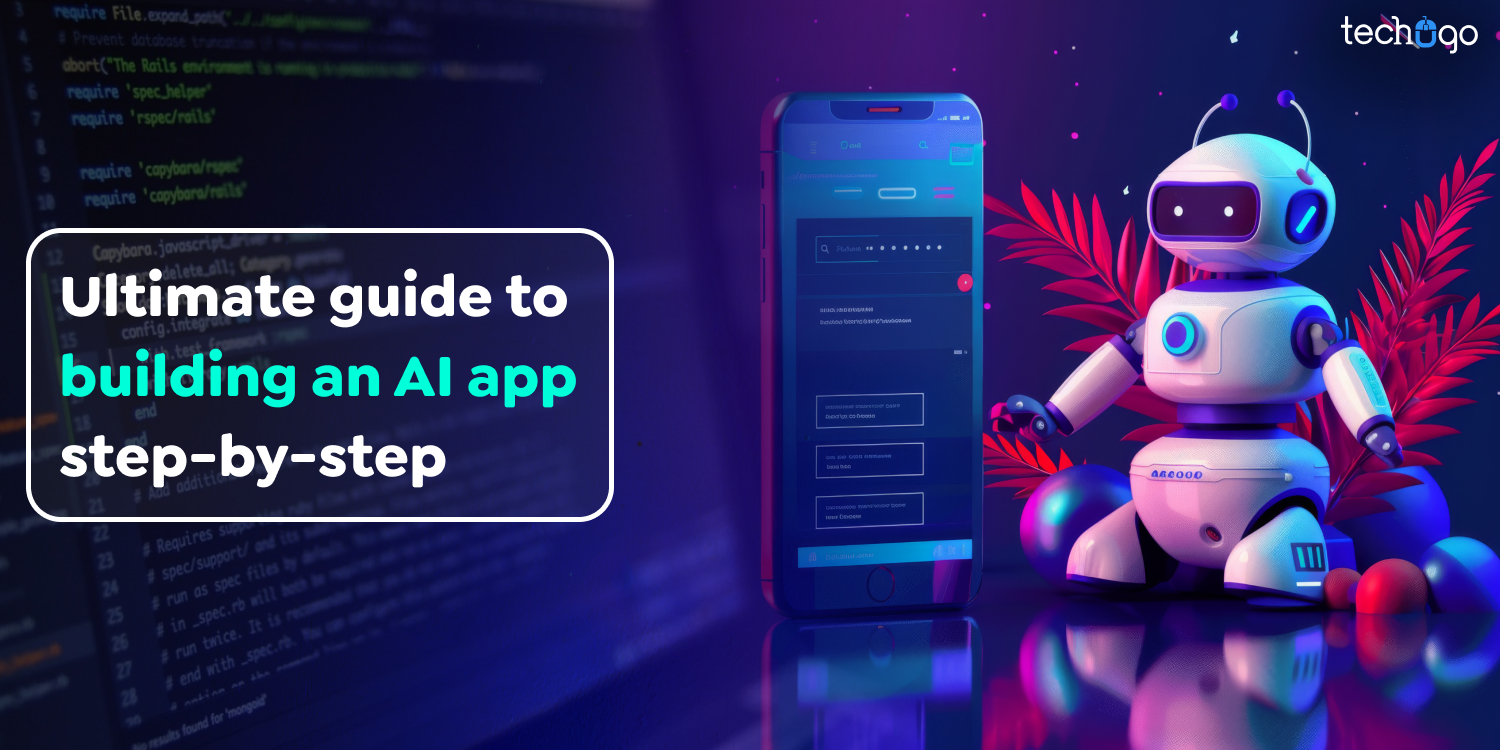6 Oct 2023
Updated on January 29th, 2025
Caring at Fingertips: Revolutionizing Healthcare with Your Innovative App
Matthew Connor
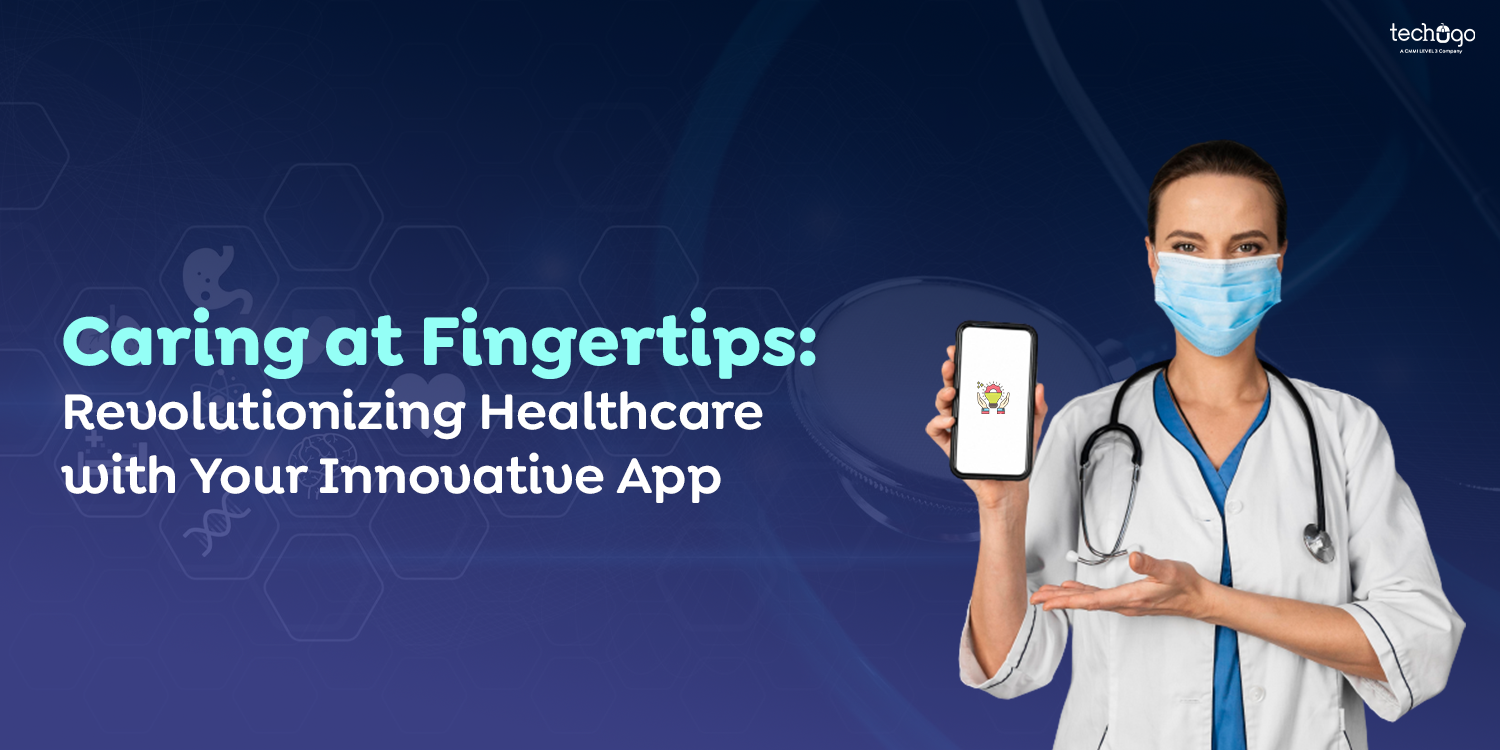
Technology has smoothly merged into every aspect of our lives in the digital era, and healthcare is no different. A healthcare mobile app development company has altered how we access and manage our medical requirements with terrific solutions and these applications have evolved into a valuable resource for patients, healthcare practitioners, and administrators alike, reducing processes, increasing efficiency, and improving the entire healthcare experience.
Healthcare mobile apps are intended to give people a quick and easy method to access healthcare services, resources, and information through their smartphones or other digital devices. These applications offer many features, such as arranging appointments, getting telehealth consultations, accessing medical information, tracking health indicators, and obtaining personalized treatment recommendations.
How Viable Is Your Healthcare App Idea?
Healthcare apps refer to creating apps for mobile devices that assist users in managing their health-related problems in real time. These issues may involve medical services, hospital experiences, computerized health data, or insurance claims.
The Creation of Healthcare Applications Serves Several Goals
- Doctors can benefit from adopting healthcare applications to track and monitor patient progress, plan visits, and manage personnel.
- Conversely, patients may use healthcare apps to arrange appointments, contact their doctor, obtain advice, and access medical records.
The mHealth market was estimated at more than $ 54.25 billion in 2021, which is impressive for such a new sector. However, the COVID-19 epidemic caused a dramatic increase in market value, which is currently expected to reach over $ 243.57 billion by 2030, with a CAGR of 18.2% from 2022 to 2030.
Aside from the doubled market size, total app usage has also seen a good shift. The number of healthcare mobile app downloads has grown by 60% globally since the commencement of COVID-19.
The impact of COVID-19 on healthcare app development globally
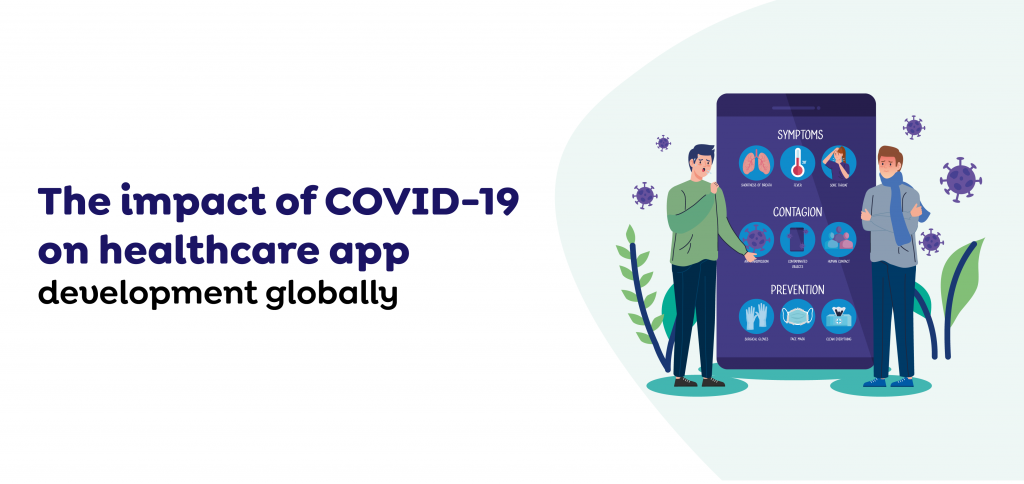
The widespread use of mobile devices and the desire for solutions that promote remote consultations and electronic prescriptions are driving the rapid advancement of the health industry’s digitization.
Moreover, the pandemic has increased the demand for developing healthcare mobile apps to avoid COVID-19 infection. As a result, medical organizations were compelled to design user-friendly software to meet these requirements.
We can see significant advances in mobile systems that track, monitor, and analyze patients’ health status and collect critical medical data to communicate with a doctor or give e-prescriptions. Integrating a payment channel to pay for appointments is simple without closing the app.
So, when you’ve decided to create healthcare mobile apps with the help of a healthcare mobile app development company, the next significant question is which features you should include. Here, you must not become confused and choose random features but rather analyze your audience and learn what they are looking for in your app.
It allows you to select features that will get your clients closer to and fond of your healthcare app.
Do you know what those characteristics are?
Scroll down for a list of features that must be integrated into your healthcare app.
Must-Have Features of Healthcare Apps! Patient App
A healthcare app can provide various features and functions to meet the demands of patients, healthcare practitioners, and administrators. Here are some crucial characteristics of a complete healthcare app:
User Profiles and Registration:
Enable users to build and maintain their profiles, including personal and medical information. It allows for more personalized interactions and guarantees that healthcare services are delivered correctly.
Appointment Scheduling:
Allow customers to arrange appointments with healthcare professionals using the app easily. There should be real-time availability, specialized choices, and location possibilities.
Telehealth & Video Consultations:
Provide secure video conferencing options for patients and healthcare professionals to consult remotely. It is particularly beneficial for non-urgent medical concerns and follow-up consultations.
Electronic Health Records (EHR) View:
Let patients and authorized healthcare practitioners gets a secure platform to view and update medical records, test findings, and treatment plans.
Medication Reminders and Tracking:
Set up medication dose and refill reminders, as well as the option to track medication adherence. It enables patients to manage their treatment programs successfully.
Healthcare Monitoring:
Integrate with wearable devices and sensors to detect vital indicators (heart rate, blood pressure, and so on) and physical activity, offering a complete picture of the user’s health.
Emergency Services and SOS:
It’s for a medical emergency that includes a one-touch emergency button connecting users to emergency services and alerting their contacts.
Health Advice and Education:
To empower users with knowledge, provide a library of medical information, health advice, and educational materials on various health issues.
Prescription Ordering & Refills:
Customers can order prescription refills directly through the app, with home delivery or drugstore pick-up options.
Orders for Lab Tests and Imaging:
Allow healthcare practitioners to order lab tests and medical imaging through the app and let users view the results.
A healthcare app that incorporates these elements may create a complete and user-friendly platform that improves the healthcare experience for patients, increases efficiency for healthcare practitioners, and streamlines administrative work for healthcare administrators.
If you want to know how Healthcare mobile apps can benefit entrepreneurs, scroll down!!
Healthcare apps will bring you more benefits when you build them with Techugo.
How do Healthcare Apps Can Benefit Entrepreneurs?
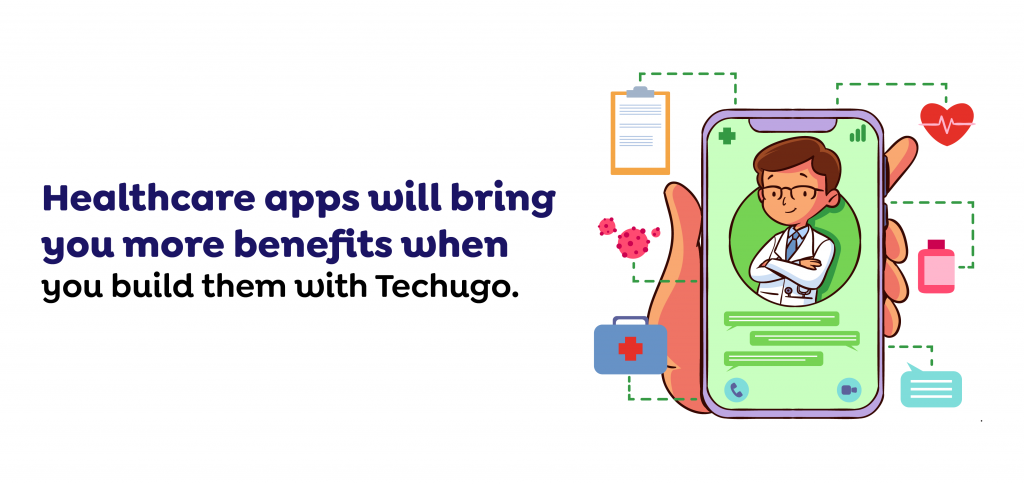
Healthcare mobile applications provide several advantages to businesses wishing to enter the healthcare market. Entrepreneurs may use these applications to build creative solutions that meet diverse demands within the healthcare ecosystem as technology continues to evolve and transform how we access and manage healthcare services. Here are some examples of how healthcare mobile applications may help entrepreneurs:
- Disruption Opportunity: The healthcare business is riped for disruption owing to its complicated and sometimes obsolete practices. Mobile apps that expedite healthcare services, improve patient experiences and offer novel solutions that challenge existing paradigms can be introduced by entrepreneurs.
- Consumer Expectations: In today’s fast-paced environment, consumers demand ease and accessibility. Healthcare applications meet this need by making it simple for users to access services such as appointment booking, telemedicine consultations, prescription management, and health monitoring.
- Additional Revenue Streams: Creating and monetizing a healthcare app may provide entrepreneurs with different revenue streams. Subscription-based services, in-app purchases, premium features, collaborations with healthcare providers, or data monetization (while adhering to privacy requirements) are all possible revenue streams.
- Patient Engagement is Improved: Healthcare applications improve patient engagement by delivering personalized experiences and tools that allow users to take charges of their health. Apps that provide interactive health challenges, instructional information, and tools for tracking and maintaining health objectives can be created by entrepreneurs.
- Data-Driven Insights: Healthcare applications collect helpful information about user behavior, health trends, and treatment outcomes. Entrepreneurs may use this data to obtain insights into healthcare demands, improve app features, and contribute to medical research and public health efforts.
- Healthcare Accessibility: By building applications that increase access to medical services for underprivileged communities, entrepreneurs may address healthcare inequities. These apps can connect people in remote or rural locations with previously unavailable healthcare providers and services.
- Partnerships and Collaborations: To enhance the reach and effect of their app, entrepreneurs might form alliances with current healthcare providers, insurers, pharmaceutical firms, and wellness organizations. Collaborations like this can boost the app’s reputation and value proposition.
- Industry Growth Potential: As technology becomes increasingly incorporated into healthcare practices, the healthcare app industry will likely rise further. Entrepreneurs who enter the market today can position themselves as significant participants in this changing landscape.
- Scalability: Successful healthcare applications may expand quickly, establishing a worldwide user base and earning significant money for entrepreneurs.
- Personalized Healthcare Solutions: Based on user health data, entrepreneurs may design applications that employ AI and machine learning to give personalized healthcare suggestions, treatment plans, and wellness initiatives.
Healthcare mobile applications provide entrepreneurs with several potentials to innovate, disrupt, and contribute to the evolution of healthcare services. Entrepreneurs may build practical solutions that help individuals and the more fantastic healthcare business by addressing user requirements, boosting efficiency, and embracing technology improvements.
What are the Benefits for Doctors and Patients from Having a Healthcare
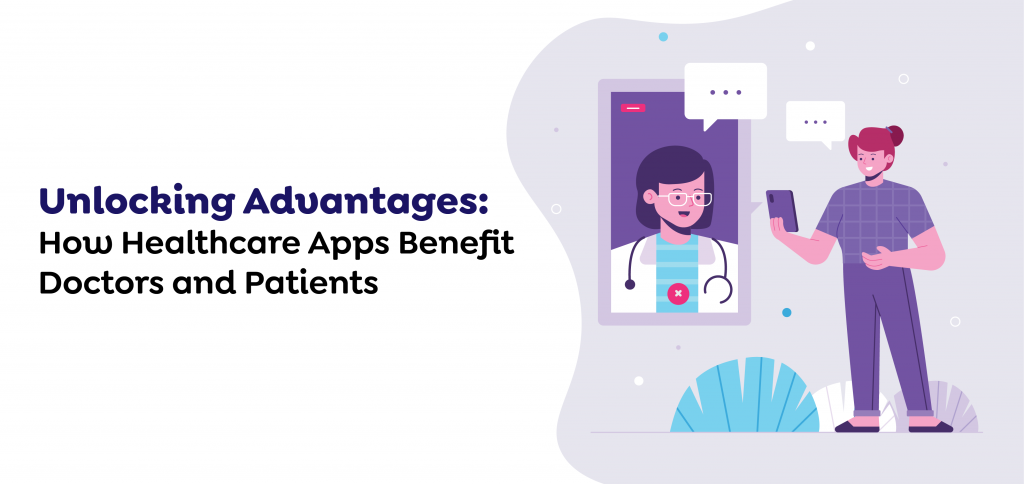
Unlocking Advantages: How Healthcare Apps Benefit Doctors and Patients
Healthcare applications provide several advantages to doctors and patients, revolutionizing how healthcare services are offered and accessed. Here are some of the primary benefits of having a healthcare app for physicians and patients:
Benefits for Doctors:
Improved Patient Engagement:
Outside of regular office visits, healthcare applications enable clinicians to connect with patients more effectively. They may create personalized treatment plans, answer queries, and remotely monitor patient progress, improving patient outcomes.
Streamlined Communication:
Apps enable doctors and patients to communicate more efficiently through encrypted texting and video consultations. It minimizes the number of phone calls and administrative strain, allowing more time for direct patient treatment.
Appointment Management:
Healthcare applications help doctors manage their calendars and appointments more effectively. Patients may use the app to arrange, reschedule, or cancel appointments, minimizing no-shows and improving time management.
Access to Patient Data:
Doctors may use the app to access electronic health records (EHR) and patient histories, assuring accurate diagnosis and treatment decisions. It is especially helpful in emergencies and when treating patients from many places.
Telehealth & Remote Consultations:
Telehealth applications enable doctors to give virtual consultations for non-urgent medical conditions. It allows them to assist patients in rural or underdeveloped locations and extends their reach beyond their physical practices.
Continuing Medical Education (CME):
Apps can give clinicians access to CME courses, medical publications, and research papers, allowing them to keep current on medical advances and best practices.
Reduced Administrative Burden:
The administrative burden is reduced since healthcare applications automate administrative chores such as appointment reminders, follow-up communications, and medication refills. It allows clinicians to devote more time to patient care and clinical decision-making.
Benefits for Patient:
Convenience and accessibility:
Healthcare applications provide users with easy access to various medical services, including appointment scheduling, medication refills, and telehealth consultations, all from the comfort of their homes.
Timely Access to Care:
Patients may obtain medical advice, consultations, and prescriptions without traveling or waiting in a clinic’s queue.
Personalized Health Management:
Apps enable patients to monitor their health indicators, manage prescriptions, and adhere to personalized treatment programs. It gives people the ability to maintain their health and wellness actively.
Educational Resources:
Healthcare applications provide patients with educational information, symptom checks, and health recommendations, allowing them to make educated health decisions.
Engagement in Health Goals:
Through gamified elements in healthcare applications, patients may establish health goals, measure progress, and earn prizes or incentives, inspiring them to adopt better lives.
Secure and Private Communication:
Apps provide a safe platform for patients to engage with their healthcare professionals, preserving the privacy and security of medical information.
Reduced Costs:
Healthcare applications that provide virtual consultations and telehealth services can minimize the need for in-person appointments, saving patients time and money associated with travel and lost work.
Access to Second Opinions:
Patients can readily obtain second opinions or specialist consultations using the app without needing extra visits or referrals.
Healthcare applications provide several benefits to doctors and patients, including outstanding communication and accessibility, increased patient participation, and data-driven insights. These applications have the potential to revolutionize the healthcare experience, resulting in improved outcomes, more patient happiness, and more efficient healthcare delivery.
Conclusion
Healthcare applications provide several benefits to doctors and patients, including excellent communication and accessibility, increased patient participation, and data-driven insights. These applications have the potential to revolutionize the healthcare experience, resulting in improved outcomes, more patient happiness, and more efficient healthcare delivery. Techugo is a mobile app and web development company that provides various services to assist organizations in creating, optimizing, and launching digital products and services. If you want to build your own Android/ iOS app for the healthcare industry, get in touch with Techugo, the mobile app development company in Canada.
Get In touch
We are excited to here from you and let’s start something special Together. Call Us for any inquiry.
Write us
sales@techugo.caJust a call away
About you
